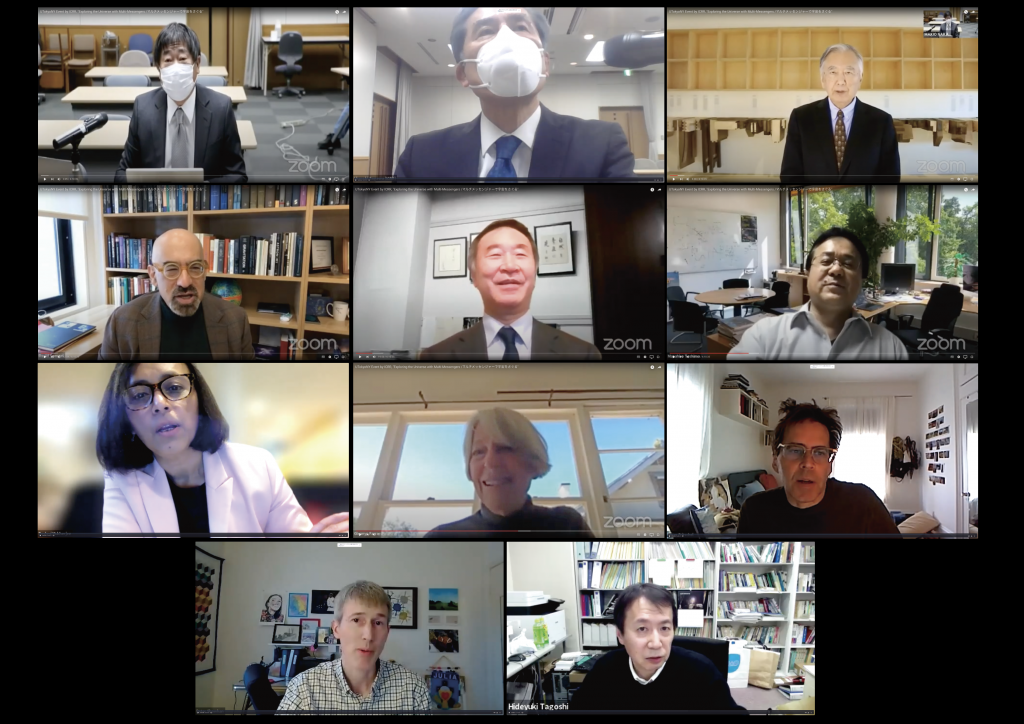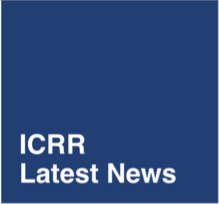Institute for Cosmic Ray Research, The University of Tokyo held, a special online symposium titled “Exploring the Universe with Multi-Messengers” on February 12, 2022 (EDT), in which researchers from Japan (ICRR) and other research institutes and universities in the USA got together to make presentations on their cutting-edge research topics to the general-public. The symposium was held at the platform of Zoom conference with live streaming on YouTube and watched by more than 300 people including YouTube viewers in two weeks after the event. We are so much grateful for your attention.

This event was the first symposium organized by ICRR to connect people living in Japan, the USA and the other areas in the world, commemorating the University of Tokyo New York Office (UTokyoNY) after its full renovation. As one of the UTokyoNY events, ICRR was very happy to be supported by the External Relations Promotion Group, UTokyo and UTokyoNY. Initially, the event had planned to be held at a real venue in New York with online mode but decided to be operated completely online from midnight-Japan due to the COVID-19 situation.
ICRR explores the frontier of the cosmic ray physics, astrophysics and elementary particle physics based on the coordinated observation and interpretation of “multi- messenger” signals such as cosmic rays, gamma rays, neutrinos, gravitational waves, and dark matter. At the symposium, Prof. Masato Takita acts as a moderator and researchers from ICRR and other research institutes and universities in the USA made presentations on their research topics.
At the beginning, Prof. Hiroyuki Sagawa, a chairperson of the event said, “Let me tell you the number of registrants of researchers and general public exceeds 300. I would thank all of you to have interest in this symposium. I hope you will enjoy the symposium”. After that, Masaharu Masuyama, UTokyoNY President introduced UTokyoNY and David N. Spergel, President of Simons Foundation made some comment as a guest speaker.
Prof. Takaaki Kajita, Director of ICRR made key-note presentation on “Multi-Messenger Astronomy and ICRR”. After he mentioned the merger of two neutron stars which observed in 2017 by not only gravitational wave but also optic telescopes all over the world induced a lot of data including the imaginary scene of nucleosynthesis, reviewed five research fields in ICRR, saying as his conclusion “Very exciting multi-messenger astronomy is starting. ICRR would like to contribute to the multi-messenger astronomy.”
During the symposium, four research fields: Cherenkov Telescope Array (CTA), Telescope Array (TA), Tibet/ALPACA Experiment, gravitational wave observation at LIGO and KAGRA were featured. Researchers from ICRR and the USA in turns made presentations on their latest topics and answered questions from the audience (Zoom chat and Sli.do).
Speakers in each field are as follows:
| Research Project | Speaker | Affiliated Institution |
|---|---|---|
| Cherenkov Telescope Array (CTA) | Masahiro Teshima Reshmi Mukherjee | Professor of Institute for Cosmic Ray Research, UTokyo Helen Goodhart Altschul Professor of Barnard College, Columbia University |
| Telescope Array (TA) | Hiroyuki Sagawa Glennys Farrar | Vice Director, Professor of Institute for Cosmic Ray Research, UTokyo Silver Professor and Collegiate Professor of Physics at New York University |
| Tibet / ALPACA Experiment | Masato Takita | Professor of Institute for Cosmic Ray Research, UTokyo |
| Gravitational Wave Observation at LIGO and KAGRA | Peter K. Fritschel Peter Shawhan Hideyuki Tagoshi | Principal Investigator of MIT Kavli Institute for Astrophysics and Space Research Professor of University of Maryland Professor of Institute for Cosmic Ray Research, UTokyo |
The program and details can be found at the following website:
YouTuYouTube archive video has been restricted within the registrants. But we are going to make this public from March 1, 2022. Go to the following page to watch the event:





